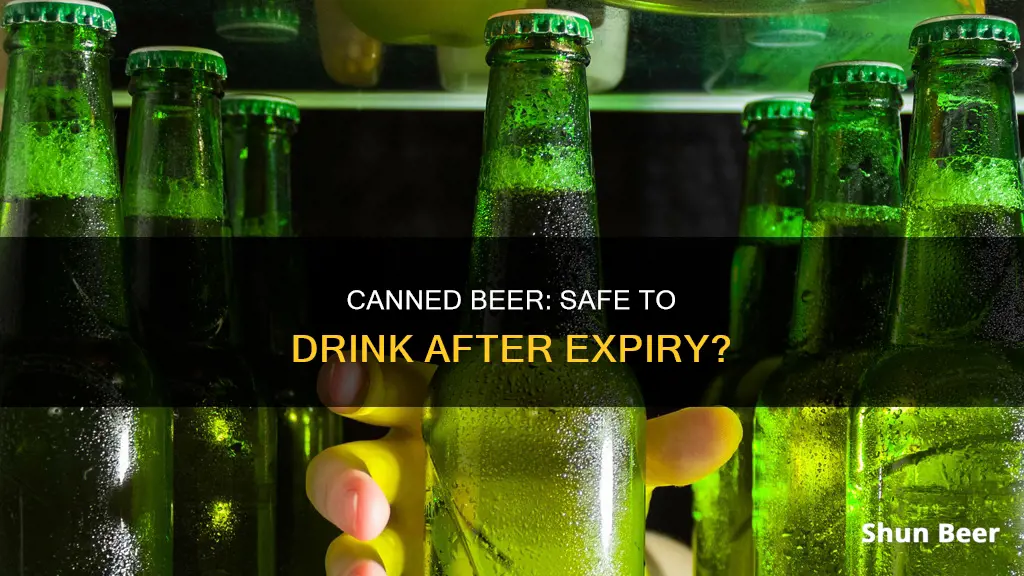
It's generally safe to drink canned beer past its expiration date. The fermentation process used in brewing, along with its low pH level and alcohol content, makes beer an unfriendly environment for harmful microorganisms. However, the taste of the beer may change over time, and it's important to check for signs of spoilage, such as a bad aroma, lack of fizz, or excessive sediment.
| Characteristics | Values |
|---|---|
| Safety | Drinking out-of-date canned beer is generally safe, although there is a small risk of bacterial build-up. |
| Taste | The beer will likely taste stale and flat. |
| Fizziness | The beer will likely have lost its fizz. |
| Alcohol Content | The alcohol content may be reduced. |
| Storage | Beer should be stored in a cool, dark place, preferably a refrigerator. |
What You'll Learn

Is it safe to drink canned beer past its best before date?
It's important to differentiate between a 'best before' date and a 'use by' date. A 'use by' date is a rule and is usually found on fresh foods like meat and dairy products. After the stated date, degradation happens quickly, and bacterial build-up means that the taste, consistency, and safety of the food or drink are compromised. You could be in danger of getting ill if you consume food or drink past its 'use by' date.
On the other hand, a 'best before' date is more of a guideline on quality rather than safety. It means the item will start to lose its quality after the stated date. You can still eat or drink after this date, but it won't be as good. Beer typically has a 'best before' date.
So, is it safe to drink canned beer past its best-before date? The answer is yes, it's probably fine to drink. The fermentation process used in brewing beer, as well as its low pH level and alcohol content, make beer an unfriendly environment for microorganisms. Even if a beer sits on the shelf for years, as long as it's sealed, it's unlikely to make you sick.
However, the taste of the beer will change over time. What was once a refreshing treat could become a real stinker. The beer will oxidize, and oxygen will cause the beer to stale, producing tones of sherry, paper, and cardboard. Hop aromas are muted, and hop beta acids oxidize to produce an unrefined bitterness.
Additionally, it's important to note that some beers age better than others. IPAs, for example, gradually lose their flavour and aroma over time and are best drunk sooner rather than later. Richer and higher ABV varieties of beer, such as porters and stouts, can improve with age, especially if they're kept in cool, dark storage conditions like a basement or cellar.
In summary, while it's generally safe to drink canned beer past its best-before date, the taste may not be as pleasant, and some beers will fare better than others.
Beer and Six-Pack Abs: Can They Coexist?
You may want to see also

What are the signs that canned beer has gone bad?
Canned beer can be safely consumed past its expiration date, but it's important to watch out for signs that it has gone bad. Here are some telltale signs that your canned beer has turned rancid:
Unpleasant Odour
A bad aroma is often the first sign that your canned beer has gone bad. If it smells like a skunk, sewage, or vinegar, it's best to discard it. Skunked beer results from exposure to UV rays, which interact with the hops in the beer to produce an unpleasant odour.
Odd Taste
Tasting the beer can also help determine if it has gone bad. If it has a strange taste, such as cabbage, sulphur, or excessive sourness, it's best to avoid consuming it. Additionally, a buttery or popcorn-like flavour could indicate the presence of diacetyl, which, while not harmful, may be undesirable in certain beer styles.
Lack of Carbonation
If your canned beer lacks the usual fizz and foam when opened, it's likely gone flat. This could be due to a broken seal, which would also significantly alter the flavour.
Excessive Sediment
Checking the bottom of the can for excessive sediment can also be indicative of spoilage. While a small amount of sediment is normal in some beer styles, an excessive amount could contribute to a poor taste.
Time and Storage Conditions
Finally, consider the amount of time that has passed since the expiration date and how the beer was stored. Beer typically lasts for six to nine months past its printed date if refrigerated and up to two years if unopened and refrigerated. However, the taste may deteriorate over time, and improper storage, such as exposure to heat or light, can accelerate the spoilage process.
Beer Drinking: How Much is Too Much Daily?
You may want to see also

How can you store canned beer to extend its shelf life?
To extend the shelf life of canned beer, it is important to store it in a cool, dark place, preferably a refrigerator. The optimal temperature range for storing beer is between 45°F and 55°F (7°C-13°C). Beer should be kept away from direct sunlight and heat sources to prevent spoilage and preserve its freshness and flavour.
It is recommended to store beer in an upright position to limit air contact and slow down the oxidation process. Additionally, keeping the beer in a dry environment is crucial to prevent bacterial growth.
Canned beer typically has a longer shelf life than bottled beer due to better protection from light exposure and oxygen. However, if you prefer bottled beer, opt for darker bottles that block out ultraviolet rays to prevent "skunking" or "lightstruck" beer.
Beer should never be stored above room temperature, and it is best to avoid freezing it as this can alter its taste. If you need to chill beer quickly, it is recommended to place the cans or bottles in a bucket of salted ice water, as salt lowers the freezing point of water, resulting in a colder temperature than ice alone.
By following these storage guidelines, you can effectively extend the shelf life of canned beer and maintain its freshness and flavour.
Pigs and Beer: A Curious Combo
You may want to see also

What factors cause the flavour of canned beer to deteriorate?
Several factors can cause the flavour of canned beer to deteriorate, and it's important to note that these factors interact with each other, making it a complex process. Here are the key factors:
Oxygen
Oxygen is a significant factor in flavour deterioration. When oxygen interacts with the compounds from malt, yeast, and hops, it causes oxidation, resulting in an unpleasant papery or cardboard-like taste. This process begins as soon as the beer is packaged and accelerates once the can or bottle is opened. Oxygen exposure also leads to a breakdown of the beer's chemicals, altering its taste.
Heat/Temperature
Heat speeds up oxidation, causing the beer to deteriorate faster. Major changes in temperature, such as moving from a cold fridge to a hot car, can have a detrimental effect on the flavour. The colder the beer is stored, the slower the oxidation process, and the longer it will stay fresh. The optimal temperature range for storing packaged beer is between 45 and 55 degrees Fahrenheit (approximately 7 to 13 degrees Celsius).
Light
Light, especially UV light, can cause a chemical reaction between UV rays and the essential oils of hops, creating a compound that smells like skunk. This is why beer exposed to sunlight for too long is said to be "skunked" or "lightstruck". Even fluorescent light can accelerate the deterioration process, so storing beer in a dark place is crucial. Brown or amber glass bottles offer some protection against UV rays, but aluminium cans provide the best protection by blocking all light.
Time
The longer the beer is stored, the more its quality will deteriorate. This is due to the ongoing oxidation process and the continued breakdown of the beer's chemicals. Additionally, the flavour-producing organisms used in the brewing process change the flavour over time, so some beers may improve with age, while others will deteriorate.
Packaging and Storage
The packaging process plays a role in flavour deterioration. If the dissolved oxygen levels in packaged beer are not controlled, it can negatively affect flavour stability. Additionally, the way beer is stored can impact its flavour. Storing beer upright helps minimise the surface area exposed to oxygen, slowing down oxidation. Beer should also be stored in a cool, dry place, away from direct sunlight and extreme heat, to prevent flavour deterioration.
Beer Drinking: A Sign of Intelligence or Stupidity?
You may want to see also

What are the health risks of drinking expired canned beer?
Drinking expired canned beer is unlikely to make you seriously ill, but it may result in an unpleasant taste experience. The fermentation process used in brewing, along with the low pH level and alcohol content, makes beer an unfriendly environment for harmful microorganisms.
However, the taste of beer does change over time, and even if the beer is sealed, it may lose its carbonation and develop a vinegary taste, indicating bacterial growth. While drinking expired beer is generally safe, it is important to note that the quality of the beer will deteriorate, and it may not taste as good as fresh beer.
Additionally, the type of beer and storage conditions can impact its longevity. Beers with higher alcohol content, such as stouts and porters, tend to age better and can even improve with time. On the other hand, IPAs and other hoppy beers are best consumed closer to their "born-on" dates, as they gradually lose their flavour and aroma.
To ensure the best quality and minimise health risks, it is recommended to store beer in a cool, dark place, preferably in the refrigerator. If stored at room temperature, it is crucial to keep it away from direct sunlight and heat sources.
Understanding Beer Screens: The Science Behind the Suds
You may want to see also
Frequently asked questions
Drinking out-of-date canned beer is generally considered safe, as the fermentation process, low pH level, and alcohol content make it difficult for harmful microorganisms to thrive. However, it's important to note that the taste and quality of the beer may deteriorate over time.
There are typically no significant health risks associated with consuming out-of-date beer. While the taste may be unpleasant due to oxidation or bacterial growth, it is unlikely to cause any adverse health issues.
To determine if an out-of-date canned beer has gone bad, check for signs such as a bad aroma, loss of carbonation, or excessive sediment at the bottom of the can. If the can is bloated or leaking, it is best to discard it as it may indicate the growth of harmful bacteria.







